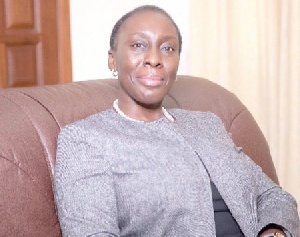 AG - Marietta Brew Appiah-Oppong
AG - Marietta Brew Appiah-Oppong
Government has to tread cautiously in its attempts to terminate the contract between Foto-X Limited and the Driver, Vehicle and Licensing Authority (DVLA) to avoid any judgement debt in the future.
The Attorney-General and Minister of Justice, who has ordered that the contract be halted, has to interrogate issues critically before any final decision is taken.
The Finder has sighted documents which indicate that Foto-X Limited has legitimate contract signed by officials of DVLA, who acted on behalf of the state.
In addition, the Public Procurement Authority (PPA) granted approval to DVLA to procure equipment worth $3.6 million under the Public-Private Partnership (PPP) project with Foto-X.
Based on this approval, Foto-X Limited invested in the equipment, which have been partially installed based on instructions from the DVLA and ready for take-off, while in actual fact the contract was diverted to another company one year ago.
Rudolph Beckley, immediate-past Chief Executive of DVLA, was in Germany with two other officials of DVLA, as well as officials of Foto-X to inspect the system.
The DVLA demanded for modifications to the system, which were done, and the Chief Executive appended his signature to approve the final products before all the equipment were airlifted to Ghana.
A letter from the Public Procurement Authority (PPA) dated June 7, 2014 granting approval to DVLA for sole sourcing quoted the new contract sum as $3.6 million.
In the same vein, another letter from PPA dated November 22, 2015, granted approval to the Controller and Accountant General’s Department (CAGD) to procure two million blank Driving Licence Cards at an estimated cost of GH?20 million.
The company, which has imported the system into the country under the new $9.9 million contract with the Driver, Vehicle and Licensing Authority (DVLA), say the allegations of overpayment under the old contract and inflating new contract sum do not represent the facts.
Foto-X has rejected the report of the Economic and Organised Crime Office (EOCO), which made adverse findings against the company.
EOCO has submitted its report to the Attorney-General for advice. It made the following findings:
1. Wrongful collection of monies as reimbursement for consumables, which had already been factored in the contract sum of $2.772 million.
(2) Overpayment of the contract sum of $2.772 million, which in cedi equivalent amounts to GH¢5,544,000 to the consultant.
(3) Fraudulent contract on the basis of: (a) Renewing the first contract, which was as turn-key project.
(b) Changing the contract sum of $3.6 million to $9,976,209.50 by the consultant without due recourse to Public Procurement Act 663, (Act 2003). The findings of the Economic and Organised Crime Office are as follows:
(a) Investigations disclosed that within the contract period of six years Foto-x was paid GH¢20,961,785 instead of GH¢5,544,000 as the equivalent of the original contract sum of $2,772,000.
The overpayment, which was discovered, was GH¢15,417,785.
(b) The wrongful payment amounting to GH¢3,011,021.29 being the cost of consumables which price had already been factored in the contract sum of $2,772 million to the consultant Foto-X.
Foto -X challenges EOCO Report
According to Foto-X, the $3.6 million was never inflated to $9.9 million because $3.6 million represents the company’s initial investment or start-up capital while $6.7 million is the money the company projects to spend as recurrent expenditure for the 10 years that the project will last.
This figure makes provision for replacement and maintenance of equipment, taxes, staff remuneration, etc.
The company explained that as a PPP project, government has not invested any money in the project.
However, the company receives 80% of revenue generated from all the licences sold as contained in the agreement.
On overpayment, the company explained that the start-up capital it invested in the 2006 project was $2.7million.
In addition, the company made other expenditure during the life of the project. In return for the investment, the contract stipulates an 80% share of revenue from the sale of licences over the contract period.
It is, therefore, unreasonable for the 80% share to be limited to only the start-up capital invested.
Regarding consumables, Foto-X said the cost of consumables was not factored into its investments in the contract as EOCO said.
The contract document sighted by The Finder listed the ID Equipment, Eye Test equipment, vehicles, working capital, pre-operating cost, customs duties as the investments cost.
In an audit conducted covering July 2006 to December 2009, the Audit Service said regulations 210 and 211 of the Financial Administration Act (FAR) enjoins the Controller and Accountant-General to print and order value books in Ghana.
As a result, the report, dated April 1, 2010, and signed by Ms Roberta Quarshie, Assistant Auditor General, advised that the procurement of PVC cards should be routed through the C&AGD in compliance with the FAR.